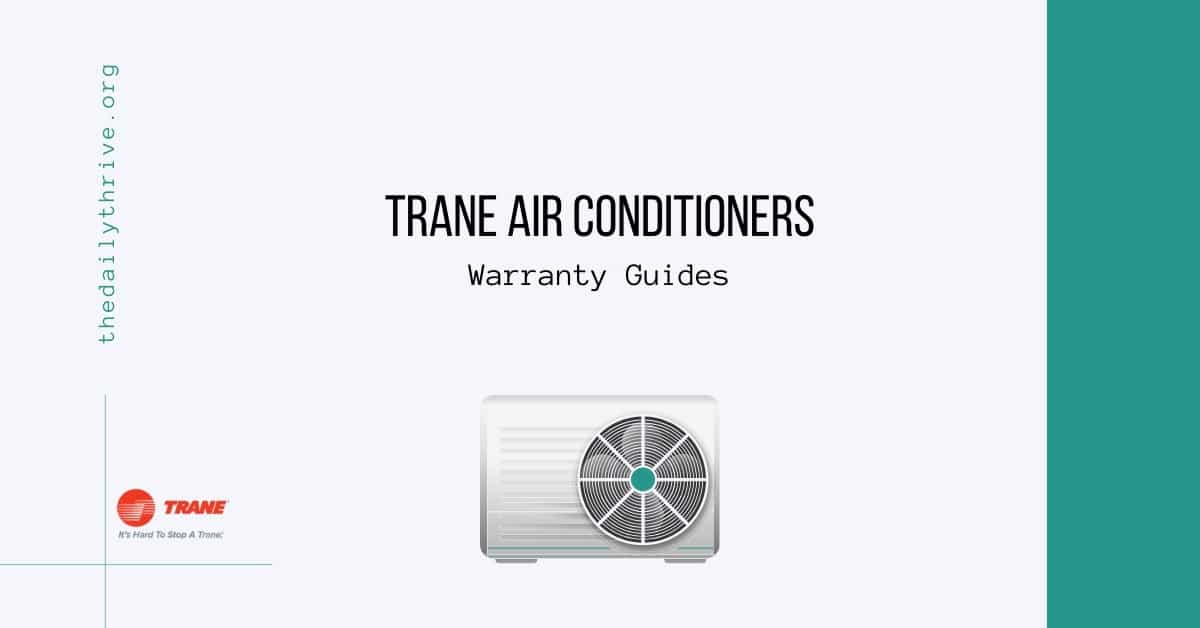This article is about our detail guide to Trane Warranty. How to register and what is covered and what isn’t. And a review on Trane extended warranties and whether they are worth the money.
Trane warranty can save you a good deal of money down the road. It should covered components malfunction and fail due to a manufacturing defect.
Air conditioning systems typically last 15 to 20 years, so a longer warranty term is effective for a significant portion of the system’s expected service life. If your A/C units is covered by trane warranty, the cost of the new component will be covered, but you may have to pay for the labor service cost.
Register Your Warranty
Trane’s Registered Limited Warranty option is no longer available. Trane’s Base Limited Warranty is now a Limited Warranty since product registration is no longer required. That’s because all Trane units now automatically include the longest available Limited Warranty for that particular product.
Trane warranty must be registered within 60 days, in order to get full coverage. You can do registration warranty by online or by phone. Otherwise, you get only the Base Limited Warranty which is much shorter, usually just five years.
Read our guide about how to register your trane warranty here Trane Registration
Types of Trane Warranties
BASE LIMITED WARRANTY
Every Trane residential unit comes with a Base Limited Warranty. This warranty covers parts that break due to manufacturer defect, but it does not cover the cost of labor. The Base Limited Warranty can range from 1 year to 20 years depending on the product.
Base Limited Warranty terms can be found in your Owner’s Manual. If you register your product within 60 days of installation, either by phone or online, then it becomes a Registered Limited Warranty.
REGISTERED LIMITED WARRANTY
If you register your new Trane product within 60 days of installation, the Base Limited Warranty is lengthened and becomes a Registered Limited Warranty at no additional cost.
This trane warranty covers parts that break due to manufacturer defect, but does not cover the cost of labor. The Registered Limited Warranty can range from 5 years to lifetime depending on the product.
Trane Registration can be completed online or by phone. If the product is not registered within 60 days of installation, Trane’s Base Limited Warranty terms will apply. Registration is not required for all states and provinces.
EXTENDED WARRANTY
The Optional Extended Warranty offers you even more protection and covers the cost of parts and labor. To purchase an Optional Extended Warranty, please contact your local Trane dealer.
For how to check if your units is under warranty, check our guide here Trane Warranty Lookup
An extended warranty starts when your standard warranty expires. The better plan is to have your system cleaned and serviced every few years and start putting away money for major repairs and replacement.
Extended warranties are also called Extended Service Agreements or ESAs. Most are third-party warranties provided by HVAC dealers.
When you plan to selling your home, potential buyers might like having an extended warranty on a air conditioning system that is 10+ years old. But that’s only if the extended warranty you purchase has a transfer clause.
Trane extended warranty require annual service contracts. Not only do you pay upfront, but you’ll have annual expenses. Most service contracts cost $100 to $250 for every maintenance calls per year, based on the equipment covered and the plan features. The service contract must be purchased from the company that sold and installed your Trane units.
Replacement A/C units is not covered by trane extended warranties, it only cover repairs. If your Trane AC or furnace breaks in 14 years, you might prefer get a new unit. It could be more efficient, so energy costs will be lower.
Those are the pros and cons of extended warranties and all you need to know about Trane Warranty. Trane known to has the quality in their heating and cooling products and back it up by offering an HVAC leading warranty program.







My 3-year-old Trane AC unit recently experienced a blown capacitor. However, when I checked the warranty information, I was surprised to see that capacitors aren’t explicitly covered. Could you please explain why this specific component wouldn’t be covered under the standard warranty for a relatively new unit?
Unfortunately, it’s impossible for me to give a definitive answer without more information about the specific situation. However, I can offer some possible explanations for why a blown capacitor on a 3-year-old Trane unit might not be covered under the manufacturer’s warranty:
1. Wear and Tear: Capacitors are considered wear-and-tear items, meaning they naturally degrade over time and are not immune to failure. While a 3-year lifespan might seem short, various factors like voltage fluctuations, extreme temperatures, or even just faulty manufacturing can contribute to premature failure.
2. Improper Installation: If the capacitor wasn’t installed correctly during the initial unit installation, it could lead to premature burnout. This wouldn’t fall under the manufacturer’s warranty as it’s considered an installer error.
3. External Factors: Sometimes, external factors like power surges or lightning strikes can damage electrical components like capacitors. These events are also generally excluded from manufacturer warranties.
4. Limited Warranty Coverage: Depending on the specific Trane model and warranty package you have, some parts might be covered for shorter periods or not at all. Carefully review your warranty documents to understand what’s covered and for how long.
5. Lack of Registration: Some manufacturers require timely registration of the unit to activate the full warranty coverage. If your unit wasn’t registered, it’s possible the capacitor isn’t covered.
Here are some recommendations for moving forward:
Is there any merit to paying $450 for an upgrade to Trane’s labor warranty on my AC unit? Beyond peace of mind, are there any significant benefits to consider alongside the initial cost?
Whether the $450 upgrade is worth it depends on several factors specific to your situation. Here’s a breakdown of both sides to help you decide:
Ultimately, the decision depends on your individual circumstances and risk tolerance. By weighing the pros and cons carefully, you can make an informed choice that best suits your needs and budget.
I hope this provides a comprehensive and well-balanced answer to your rephrased question. If you have any further questions or need more specific information, please don’t hesitate to ask!